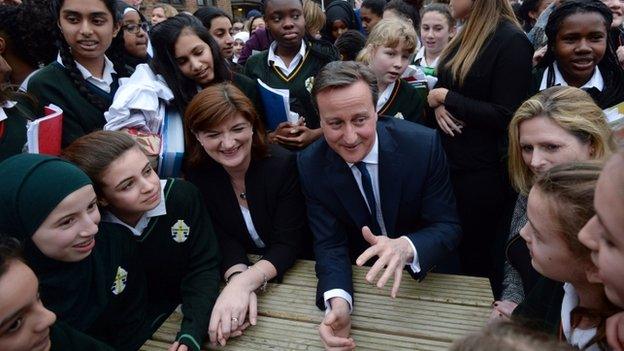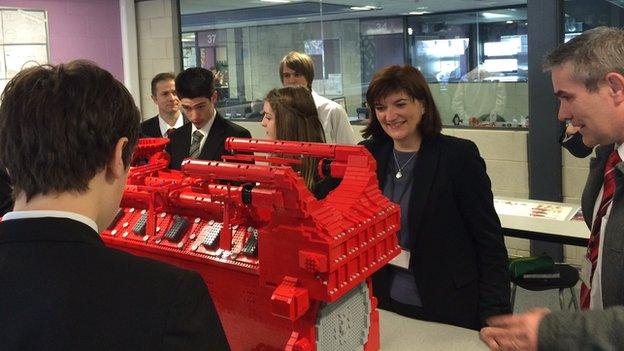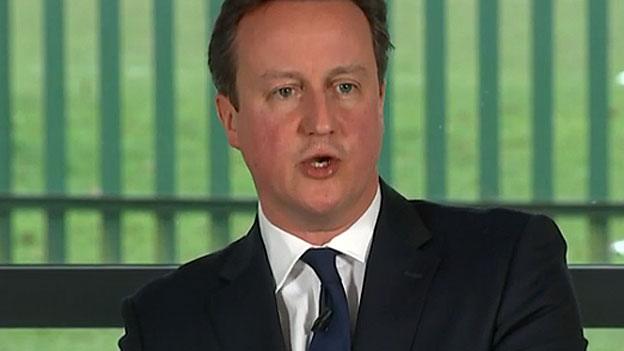Free school expansion plans launched
- Published

The Conservatives campaigned on a promise to create 270,000 more places in free schools
The flagship Conservative election pledge to open a further 500 free schools in England is being put into practice, with applications invited for new schools.
The government wants to create 270,000 extra places in free schools over the next five years.
Education Secretary Nicky Morgan described them as "modern engines of social justice".
Labour's Tristram Hunt said it was an "irresponsible" use of public funds.
The opening of the application process on Friday marks the firing of the starting gun for the next wave of free schools.
'Raising standards'
Among the proposals to be submitted will be New Croydon Academy, with a focus on science and technology, and Gipsy Hill Secondary Academy, where a group of primary schools in south London want to set up a secondary school.

Nicky Morgan on a visit to Corby Technical School: She says free schools will raise aspirations
Free schools, with more than 250 already open and more than 150 approved, are new state schools which have the same independence as academies, operating outside the local authority and with greater flexibility over the curriculum and staffing.
During the election campaign, Prime Minister David Cameron said these start-up schools were "raising standards and restoring discipline".
They were introduced under the coalition government, with the aim of bringing more choice and innovation and allowing local parents and community groups to create their own schools if they thought there was a lack of good quality local schools.
But the trend has been towards free schools being opened by existing professional school groups.
An analysis published by the Policy Exchange think tank showed that in the most recent waves of free schools, more than two-thirds were opened by academies or academy chains. Fewer than a fifth were opened by parents and community groups.
They have faced opposition from Labour and the teachers' unions, who have accused the free-school project of failing to deliver extra school places where they are most needed.
'Social justice'
But the Department for Education says that almost three-quarters of the 125,000 free school places created were in areas with a shortage. And it says "half are in the most deprived communities in the country".
"Free schools are at the heart of the government's commitment to deliver real social justice by ensuring all pupils have access to a world-class education," said Mrs Morgan.
"This is at the core of our commitment to govern as one nation - creating a country where everyone, regardless of their background, can achieve their high aspirations."
Free schools provided a "fresh chance for families to break the cycle of disadvantage by providing a quality of schooling never before seen in many communities", said the education secretary.
Sarah Pearson, interim director of the New Schools Network, which supports the opening of free schools, says they have been working with about 30 groups wanting to set up schools.
These groups had been "putting in the hours in the last few months to finalise their applications", she said.
The New Schools Network gave examples of those expected to submit applications:
New Croydon Academy will focus on STEAM (science, technology, engineering, arts and maths). The secondary school will be part of a campus with Croydon College, University Centre Croydon and the Croydon School of Art.
Kingsmead primary school in Enfield, proposed by Kingsmead secondary school, will address a local shortage of places. The focus will be on performing and visual arts.
Gipsy Hill Secondary Academy is being proposed by a federation of primary schools in south London.
XP, a secondary school opened in Doncaster in September 2014, set up by a teacher group, is looking to set up a second secondary school in Doncaster. It wants to "pioneer a more innovative style of education".
Sir Craig Tunstall, executive head teacher of the federation leading the Gipsy Hill bid, said they wanted to tackle the problem of bright pupils in primary school falling behind when they transfer to secondary school.
"In our area there is a shortage of outstanding secondary places and too often the first year is spent treading water academically because teachers and pupils are taking time getting to know each from scratch."
Budget cuts
But Tristram Hunt, shadow education secretary, said: "When there is a shortage of school places, rising class sizes, widespread teacher shortages and schools face significant real-terms budget cuts, parents will find it odd that David Cameron continues to plough hundreds of millions of pounds into building new schools in areas where there is already a surplus of places."
Christine Blower, leader of the National Union of Teachers, said: "As the government knows, free schools and academies do not raise standards in any more effective way than maintained schools."
She said it was "far more about privatisation and ideology than social justice and equality".
Chris Keates, leader of the NASUWT teachers' union, said: "Local authorities should be left to manage place provision and to determine the type of school provision that would best meet the needs of local communities."
- Published9 March 2015
